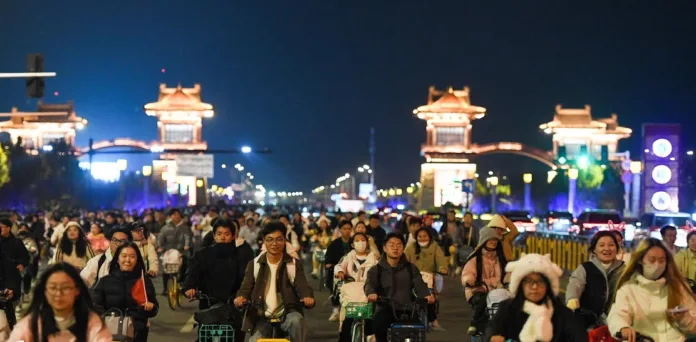A viral social media trend that began as a quest for breakfast dumplings led to gridlocked roads, overwhelming police efforts, and regrets from participants
What was initially meant to be a fun and spontaneous social media trend quickly spiralled into a chaotic and frustrating experience for thousands of young people in China. The “Night Ride to Kaifeng,” a popular challenge among university students, saw tens of thousands of cyclists journeying overnight from Zhengzhou to Kaifeng, about 50 kilometres (30 miles) away, in search of the famed guantangbao (soup dumplings). However, what was meant to boost the local economy and bring excitement to the ancient city of Kaifeng ended up clogging roads, creating gridlocks, and prompting police interventions.
The trend, which began in June with just four university students cycling to Kaifeng for the dumplings, had taken off rapidly in the following months, resonating with young people seeking relief from the pressures of a competitive and high-stress job market. The initial riders shared the sentiment that “you don’t get a second chance at youth,” inspiring many others to join in. For these students, the ride became a symbolic act of spontaneity and defiance against the grind of daily life.
State media, recognising the appeal of this youthful rebellion, initially praised the trend as a demonstration of youthful “passion,” and local authorities saw an opportunity to revive the success of another viral sensation — the barbecue craze in Zibo. In anticipation of a surge of cyclists, Kaifeng’s officials even announced discounts and events aimed at attracting college students to the city, alongside additional traffic measures to ensure safety.
But when the night ride took place on November 9, it quickly devolved into chaos. What was expected to be a fun, picturesque ride turned into a traffic nightmare as the expressway between Zhengzhou and Kaifeng filled with thousands of cyclists. Social media posts showed bicycles spilling across six-lane highways, as police vehicles and drones patrolled the route, urging the cyclists to turn back. Bike rental companies also warned they would remotely disable bikes rented from Zhengzhou if taken out of the city.
One participant, 27-year-old Li, joined the ride on a motorbike, saying she was inspired by the trend to relive her youthful spirit. But as the ride progressed, the situation became increasingly stressful. “There were ambulances and traffic police cars on both sides of the road,” Li told BBC News. “You could see drones flying above to monitor the traffic.” Despite the festive mood initially shared by the riders, the reality of the crowded roads set in quickly, with reports of cyclists struggling to push their way through the gridlock.
A journey that usually took around one hour by car stretched to over three hours for many drivers. One cyclist, who had spent seven hours on the road, took to social media to express regret over the experience. “I couldn’t get a taxi or a hotel room, and the city was overcrowded. I’m sorry for disturbing the people of Kaifeng,” the post read.
As the night wore on, some participants vented their frustration online, complaining of littering, overcrowding, and a general sense of regret over their impulsive decision. “I really regret going,” echoed many students, realising the challenges of coordinating accommodation, transport, and basic amenities in an already overwhelmed city.
In the aftermath of the chaos, three major bike-sharing platforms in China issued a joint statement advising students to avoid using bikes for long-distance travel at night for safety reasons. The platforms began charging fees for cyclists who rode their bikes to different cities, and local authorities in both Zhengzhou and Kaifeng responded by closing down several cycling lanes. Several universities in Zhengzhou also imposed restrictions, asking students to return to their dormitories and curbing unnecessary travel.
Despite the backlash, many young people, including Li, believe that these spontaneous gatherings are a sign of youth struggling to break free from the monotony of life in China’s fiercely competitive environment. “People are so stressed these days, so these events are a good thing,” she said. “Happiness is infectious.”
Authorities in China, historically cautious about large gatherings, have long viewed such events with suspicion, fearing the potential for protests or dissent. Last month, for example, Shanghai police shut down Halloween celebrations in fear of any unsanctioned political expression. The government’s response to the Kaifeng ride is likely to prompt further discussions about the role of social media trends, youth culture, and the growing pressure felt by younger generations in China.

Comments are closed.